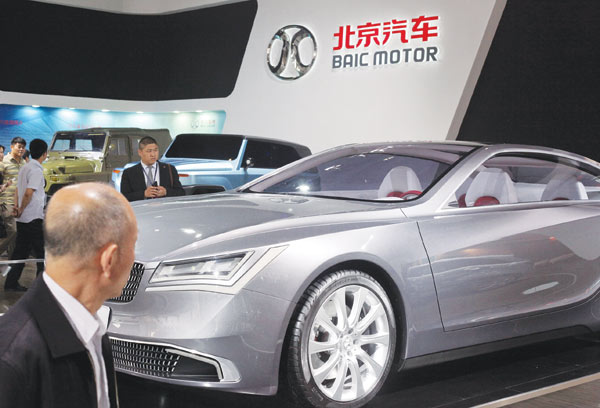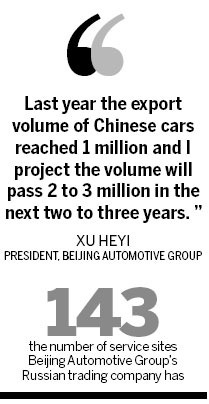New frontiers but no easy money in the car market
By Wang Chao (China Daily) Updated: 2013-07-15 07:25
|
 BAIC established an international company and launched its global expansion plan last month. [Photo / Provided to China Daily]
|
Chinese automakers are setting up manufacturing operations overseas
State auto groups in China used to sit back and harvest the easy money from joint-venture brands, but as the domestic market cools and their ambitions grow, international markets have become a greener pasture.
At the end of last month, Beijing Automotive Group (known as BAIC), one of the largest auto groups in China in terms of sales volume, established an international company and launched its global expansion plan, following another two major auto groups, FAW Group Corp and Dongfeng Motor Corp, which had already founded their overseas branches.
Analysts often criticize auto groups for being too comfortable, as they usually have one or two joint-venture partners producing popular and profitable models. Last year one of BAIC's joint-venture brands, Hyundai, produced 860,000 cars in China, up 16 percent year-on-year. This increase almost doubled the average growth rate of the Chinese auto market.
As the first State company to reap a profit of more than 10 billion yuan ($1.63 billion), BAIC is also a pampered son of the Beijing government, enjoying good financing treatment and favorable policies.
But as private auto brands gradually conquer overseas frontiers, State auto groups are no longer happy with just their "free lunches".
Dong Haiyang, president of BAIC International, says the international company is not only a channel for exports but also a means of finding more overseas resources, especially talented recruits and M&A targets.
BAIC has just established an off-shore company in Hong Kong to do financing in the local currencies of destination markets. "This money will be used on overseas investments and acquisitions," Dong says.
The company is doing research on two European auto brands, he says, which could be springboards for its expansion in Europe.
Dong does not reveal the names of the two European brands, but says "they are medium-sized, with good images in Europe and have good manufacturing capabilities".
"We will acquire them just as SAIC (Motor Corp) acquired Rover," he says. "The targets we are looking for have to be mid- to high-end brands, so we can get an entrance ticket into Europe."
As a major car-producing region, Europe has quite a few brands that are well known yet not operating very well. After Geely Holding Group Co Ltd's acquisition of Volvo Group and SAIC's acquisition of Rover, rising Chinese automakers have become a silver lining for these struggling European brands. They count on these cashed-up Chinese companies to save them from bad financial results.
This is not the first time BAIC has looked to acquire European brands. In 2009 it spent $200 million to buy three Saab platforms and used them to develop its own passenger car. This time, BAIC plans to take things further by completely acquiring the brand as well as all the intellectual property and manufacturing bases attached to it.
"In recent years, trade barriers have evolved from tariffs to all sorts of variations such as emission and safety requirements," Dong says. "The CCC standard widely used in China is rarely recognized in overseas markets, and to pass European certification is very time-consuming. So acquiring local brands is a wise choice."
- China 'incredibly innovative' in many areas: Apple CEO
- City official: Guangzhou further committed to opening-up
- Jack Ma: Globalization backed by technology will cut inequality
- HNA confirms interest in ASEAN's infrastructure investment
- Comments on Xi's letter to 2017 Fortune Global Forum
- China to create more opportunities for the world: Xi
- US tax cuts impact on China two-sided: economists
- Chinese enterprises job fair to be held in Sri Lanka

















